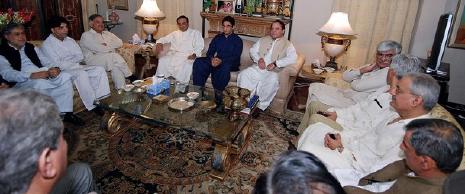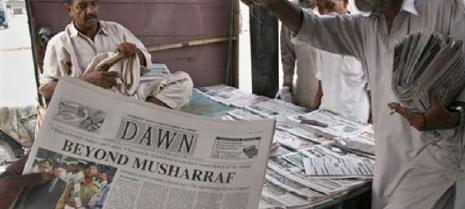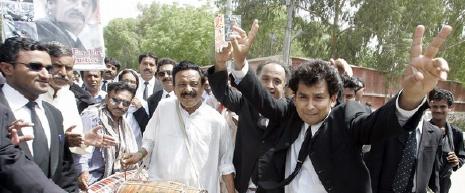Adil Najam
One of the most important decision in Pakistan’s political history was made yesterday when Gen. Pervez Musharraf was made to resign from the Presidency. Equally, and possibly more, important decisions are being made right now by the political leadership of the ruling coalition. It is these decisions being made now that will ultimately effect not only the immediate but the long-term future of the country and which will, in many ways, determine the real significance of the decision made yesterday.
As the political leadership of the country continues its deliberations four questions in particular seem critical. The answers they come up will will impact what happens to Pakistan politics as well as what happens to Pakistan’s political leadership itself.
On each of the following four key decision points, what do you think will happen? What do you think should happen?
![]()
Question #1. Who will replace Gen. Pervez Musharraf as President of Pakistan?
The names being thrown around, some I think less seriously than others, include those of Afsaryab Khattak, Afsandyar Wali Khan, Fazlur Rahman, Dr Fehmida Mirza, Aftab Shaaban Mirani, Faryal Talpur, Attaullah Mengal, Saeeduz Zaman Siddiqui, Mehmood Achakzai, Aitizaz Ahsan, Rana Bhagwandas, Fakharuddin Ibrahim, and many others. As important as the choice of the President is the signal it will send about whether the nature and powers of the President will also be cut down or not. What do you think will happen? What do you think should happen?
Question #2. Will Chief Justice Iftikhar Chaudhry and his fellow judges be restored? And when?
The really important question here is the “when”. PML(N) wants the judges to be restored immediately. If they are not, what signal will this send to the PML(N) and the country about their role and power within the ruling coalition? What, really, are the pros and cons of an early restoration, and for whom? The one question that may be even more important than the “when” question here, is the “under what conditions” question. That is the question one hears less about but will may ultimately determine what comes, or does not come, out of the judges moevement. What do you think will happen? What do you think should happen?
Question #3. What is the future of the ruling coalition itself?
The ruling coalition was really constructed as a coalition against Gen. Musharraf. Its primary purpose was to remove Gen. Musharraf from office. It has been spectacularly successful in doing that. What now? Will it survive? In what form? Should it survive at all? Will it be more healthy if PML(N) now becomes a parliamentary opposition which, in a functioning democracy, is as important as a government? What do you think will happen? What do you think should happen?
Question #4. What about the survival issues of the Pakistani awam: Bijli, Paani, Nokri, Naan?
Ultimately, this is the most important question of all. Till now, with a visibly divided government, the political parties could ward of part of the economic woes faced by ordinary Pakistanis to Gen. Musharraf and his past policies. Now, they will have to – and quickly – demonstrate that they can and will do something about these major crises. It is not clear what they plan to, or even can, do. But if they don’t their popularity will be seriously imperiled. What do you think will happen? What do you think should happen?























































I think Faraz has a very legitimate questions. Please dont over analyse them like everything else and come to con~senses.
To answer his questions, yes democracy should prevail!
Pakistani AWAMs hands may be tied due to economy, personal insecurities or religion but they are not dumb
If Zaradari name his son as a cochair of the party, it wont fly for too long unless son shows the ability.
Leaders will soon act as leaders and not the masters.
Ahmad, of course your responses were full of insults. So thanks for a clean response this time and for clarifying your argument/concerns. Now we can move on. I agree with your explanation and I do see problems with how my question was phrased. So back to my original post, and let me try to rephrase my question to comply with your standards:
> Large areas of Pakistan are still under the feudal system. If that’s true (you can disagree) does that hinder a true democracy? Are people allowed to vote freely? Or are they intimidated and forced to vote against their will? Is this phenomenon widespead enough to have an impact on the election results.
> The literacy rate of Pakistan is among the lowest in the world. Is that a problem? Does literacy significantly affect a person’s ability to vote for the best possible candidate? Is an “illiterate” person more easily deceived than a “literate” person?
> During elections people often use the phrase “chose the lesser of the two evils.” Were any of the candidates during the recent elections sincere? Do people even have the option of electing decent legislators? Are NS and Zardari not the last two people you would want to run this country? Will it get better in the future, given the dynastic nature of politics (Bilawal being a recent example of this).
No insults at all, my friend. These guys will probably kick both of our comments out if we got there :-)
But, I am sorry, your questions are still not questions, they are answers. Remember, a question is a question only if t can be answered in multiple ways and not in only one particular way. It becomes a leading question when it is posed in a way that the desired answer is already imbedded in the question.
Your last comment has FIVE (5) question marks but really one honest question. The first question mark really is an honest question (i.e., not leading), but that I have already answered in my previous message. The next four question marks are not questions at all. They are answers which you have disguised as questions. They would not stand for a minute even in an undergrad class (I am not trying to insult, only explain).
The way you have set up your question, each of these questions has an imbedded assumption which is not “questionable” in your view but may be in the view o the respondent. For example, in your second question you require your respondent to assume that we have elected corrupt people five consecutive times. What if the respondent does not agree with this. That would mean that one would have to question the question, rather than answer it. That would make it argumentative. Hence, it would be disqualified in any serious analytical discussion.
The third question is also not a question since it assumes that a particular (your favored) answer has already been given to your second question. The last two questions are beyond even rhetorical. Even structurally the would not qualify as questions. They are simply statements that you end with question marks.
What you seem to be seeking is not answers, but validations of your already held positions. I may well agree with your position, but that still does not make them “questions.” Hence, these are dishonest questions.
An honest question is one that is open to the possibility of answers that you do not agree with or may not like (e.g., “what time is it?” is an honest question, because it does not pressurize the respondent to only give the answer you want).
Sorry for the long technical answer. I guess some of us do remember the elementary rules of analytical discussion from those freshman undergraduate classes :-)
Ahmad, how is that not an honest question or not worthy of some thought? Have you forgotten that we just elected the same corrupt people for 5 consecutive times now? Why should we not ask ourselves why and how? Are we just in the process of learning and eventually we’ll find our way out of this mess? Or do we need some serious reforms before real democracy can take root?
And please no more insults.
Faraz, my friend, if you want an analytical answer maybe you should start with a question that is worthy of analysis. What you had was a bunch of “answers” disguised as a question. Lawyers call this “leading questions” and there is a reason why they are considered to be sly and unfair attempts and not allowed in serious discussions.
So, as I said, yes you are missing something. Came back when you have an honest question instead of slogans, and maybe you will get an honest answer.